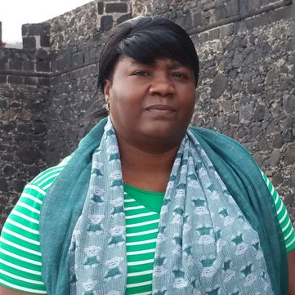Gun attack on car of Alfamir Castillo Bermúdez
On 11 January 2019, the vehicle in which Alfamir Castillo Bermúdez was travelling was shot at by two unidentified men on a motorcycle while she was on her way to Pradera, Valle del Cauca. This is the latest in a series of threats and incidents, which have increased since the end of 2018, against the woman human rights defender.
 Alfamir Castillo Bermúdez has been a human rights defender and social leader since 2008. She began her human rights work following the extrajudicial execution of her son, Darbey Mosquera Castillo, by the Military Forces of Colombia in the context of the armed conflict. Since then, she has dedicated herself to the pursuit of truth and justice in Colombia in relation to extrajudicial killings carried out during the conflict.
Alfamir Castillo Bermúdez has been a human rights defender and social leader since 2008. She began her human rights work following the extrajudicial execution of her son, Darbey Mosquera Castillo, by the Military Forces of Colombia in the context of the armed conflict. Since then, she has dedicated herself to the pursuit of truth and justice in Colombia in relation to extrajudicial killings carried out during the conflict.
On 11 January 2019, the vehicle in which Alfamir Castillo Bermúdez was travelling was shot at by two unidentified men on a motorcycle while she was on her way to Pradera, Valle del Cauca. This is the latest in a series of threats and incidents, which have increased since the end of 2018, against the woman human rights defender.
Alfamir Castillo Bermúdez has been a human rights defender and social leader since 2008. She began her human rights work following the extrajudicial execution of her son, Darbey Mosquera Castillo, by the Military Forces of Colombia in the context of the armed conflict. Since then, she has dedicated herself to the pursuit of truth and justice in Colombia in relation to extrajudicial killings carried out during the conflict
Over the past ten years Alfamir Castillo Bermúdez has exposed several crimes involving members of the Colombian armed forces. Her work has led to ten separate investigations, resulting in six cases being taken against members of the forces. Due to the reprisals she has consequently faced, the Inter-American Commission on Human Rights granted precautionary measures for the defender’s protection in October 2012. The measures are being implemented by the Colombian National Protection Unit.
At approximately 8p.m. on 11 January 2019, the vehicle that Alfamir Castillo Bermúdez was travelling in was shot at by two unidentified men on a motorcycle while she was on her way to Pradera, Valle del Cauca. The car was being driven by a member of her National Protection Unit team. Two bullets hit a back seat window in the car but no-one was injured. Following the attack, the driver proceeded to Candelaria Police Station (Valle) to report it. The attack comes after a series of specific threats against the human rights defender, including on the day of the incident where she received a text message stating “...don’t think we are not joking…not even your protection team will be able to save you [for] ... all we went through…”.
Alfamir Castillo Bermúdez has been the target of death threats, intimidation and attacks since 2012, always in the context of criminal hearings against army members implicated in cases of extrajudicial executions she had been working on.
These incidents have increased since the end of 2018: in October and November she received multiple threatening text messages and e-mails - including death threats - while in December there was an attempted break-in at her house.
In the days preceding the attack, Alfamir Castillo Bermúdez received several text messages threatening her life in relation to a hearing set up by the Special Jurisdiction of Peace (Jurisdicción Especial de Paz) on the case of retired army general Mario Montoya Uribe.
Front Line Defenders is deeply concerned about the increasing violence against human rights defenders in Colombia, which witnessed more killings of defenders than any other country worldwide in 2018. Front Line Defenders is also concerned about the lack of official recognition of the systematic character of these crimes, which are often carried out with the participation or tolerance of state agents, reinforcing the country’s high levels of impunity regarding crimes against human rights defenders.
